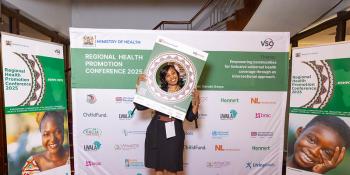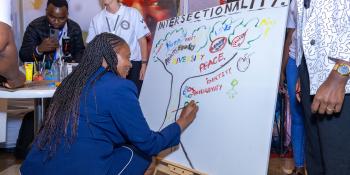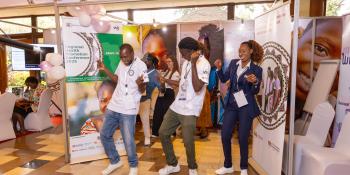More than 40 international VSO volunteers are now ‘working remotely’, giving online support to vital projects around the world, despite having had to return home due to COVID-19
In the past few weeks, hundreds of thousands of people have made the switch to working from home as countries have gone into lockdown. Our volunteers are no different, becoming e-volunteers providing virtual support.
For some, COVID-19 has meant returning to their home country if there was time to leave before the borders closed and flights ceased. For others, it has not been possible to return and these volunteers have stayed in country, working remotely. Some have had a choice to stay or remain, some have been asked to leave.
Despite these different circumstances facing volunteers, many are still finding ways to make an impact – read on to hear from five of our volunteers carrying on fighting poverty in spite of lockdown.
"My biggest fear is people will feel we've forgotten them"
James Russell, 35, and Nicola Whybrow, 38, are both volunteers on the Sisters for Sisters’ Education project in Surkhet, Nepal. Through this project, they are helping to make education more inclusive and improve educational outcomes for adolescent girls.
“While we were on placement, James and I were watching what was happening in the UK. We saw the school closures, and then the Nepali government called for a lockdown,” says Nicola. This decision has left more than six million children out of school in Nepal, and learning from home is a massive challenge, when only 24% of households have daily access the internet.
“My biggest fear is people will feel we’ve forgotten them. We are doing our best to stay in contact with communities. The real challenge is supporting leaders to plan for a rapid response - when schools closed the general feeling was that they would ride out the closure and then it would be back to business as usual.”
“For the first couple of weeks, James and I were constantly on the phone, talking through ideas on how we could continue to support remotely. We were both keen for something to be in place to support children as soon as possible.”
“I am grateful to be busy; it feels like we are working on response plans and documents that will have an impact.”
Now, James and Nicola are developing a contingency strategy and seeing what distance learning options are available in the Nepali context. One plan is to create a radio programme that will address psychosocial issues and how children can keep themselves safe. In the future, this will be expanded, adapting content taken from the national curriculum.
James, from Dorset, UK, would normally be running teacher training sessions, observing lessons and giving coaching and feedback across 12 Nepali schools. Now, his focus has completely shifted.
“The big impact I can have is supporting colleagues finding a way through this and negotiating a changed landscape. As a volunteer, of course you offer your expertise but it’s more than that, it’s motivation for teachers and other volunteers across the project to keep going,” says James.
James hopes that lockdown will disrupt the lecture-style teaching methods imposed by many schools. “I can see a huge opportunity out of this disaster. Most Nepali classrooms are set up so that teachers talk at children.”
“There’s an opportunity to use built-in infrastructure of TV and radio in the future to run distance learning sessions, with more engaging task-based activities.”
“Since the crisis, there’s been pressure from the Nepali government for telecoms companies to provide cheap Internet access.”
"Carrying on gives you a sense of purpose"
None of us have gone through this before, we’re all still learning,” says Anne Harrop, from York, UK, who has just returned from Myanmar, where she had spent eight months as a social cohesion adviser.
As countries started closing borders, Anne requested to return home to be able to support her elderly parents. However, this hasn’t stopped her from supporting her Burmese colleagues.
“I was sad to leave unexpectedly but being able to carry on as a volunteer gives you structure, normality, a sense of purpose.”
As a volunteer, Anne’s work is centred around social cohesion including reaching out to ethnic minority groups who face entrenched inequality, building empathy between people in society and helping to open up dialogue between different groups.
Anne continues to have a vital impact by preparing training and resources, and still meets with her team over Skype and email.
“It’s strange to look out of the window and see York, but then think about the context of Myanmar. However, being a volunteer, you learn to be flexible and adapt to different situations.”
"Now more than ever communication is important"
Diana Holmes, 62, is a communications volunteer who returned to the UK after just two months in Malawi.
“I felt very sad to leave. I was just starting to get to know my colleagues and understand the requirements of the role, however staying was not really an option for me. Malawi isn’t well equipped to handle a pandemic with less then 30 ICU beds to serve a population of 17 million. Should I have required medical attention for any reason I would have presented a major problem for the country office. So, as the borders started closing, we were strongly advised to return home. The VSO team responded very quickly and were enormously supportive.”
For volunteers like Diana, COVID-19 has led to much disruption. VSO has given advice to volunteers about remaining safe in the pandemic, offering as much practical support as possible during the disruption of moving countries or managing everyday life in much altered circumstances.
While in Malawi, Diana was helping to raise the visibility of VSO Malawi’s activities within government bodies and other local organisations, and had just started to develop a marketing strategy for the next six months.
Diana continues to make an impact, now working remotely from Suffolk as an e-volunteer. This includes writing newsletters to keep donors, partners and stakeholders informed on the COVID-19 response plans in Malawi. Diana says the success of VSO projects is dependent on keeping everyone fully up-to-speed: frequent, effective communication always plays a central role, but now it is even more important.
“I am sorry not to be there with the team and hope very much to return.”
The rise of e-volunteers
VSO has been working through e-volunteers and harnessing expertise from around the globe, including 40 top university professors dedicating 1,500 hours in total to creating a guide for educating young children in fragile contexts. VSO volunteers have since introduced the guide in Rohingya refugee camps, and it's now been downloaded 22,000 times worldwide. In the next few weeks, the number of e-volunteers is set to double as professionals lend their time during lockdown.
Gail Aldwin, from Dorchester, UK, was volunteering in Bidibidi, a refugee settlement in Uganda, but had to return early due to the coronavirus outbreak. She’s now juggling e-volunteering with her job as an author. Working from the spare room of her house, Gail is currently looking at ways to support the psychosocial wellbeing of young children in the poorest countries during this time.
“The e-volunteer position will enable me to continue to work with colleagues at Bidibidi and support VSO more widely by producing advice documents and resources to enable psychosocial support to become embedded in educational provision for young children and their families.”
Purna Shrestha, VSO’s lead education adviser, believes the changes made during the novel coronavirus outbreak could lead to long-term change.
“This technology is becoming cheaper, and we’re starting to see countries investing in infrastructure due to this crisis. People now have mobile handsets and can connect to the internet.
“Normally volunteers live in communities all the time, but in the future we could consider combining face-to-face volunteering with interactive videos and recordings. Farmers could watch a video on how to improve farming skills, or teachers could learn interactive teaching methods through a video.
“We’re seeing people start to work from home in many countries where there hasn’t been a culture of working from home, out of necessity.
“Going forward, in development organisations, I can see that by using a blend of technology and other resources, we will be able to share skills from anywhere.”
Besides the shift to volunteers working remotely, VSO still has thousands of volunteers still continuing their work in the communities they are from. With VSO training, these volunteers are equipped to respond to emergencies, whether that might be from disasters, climate-related crises, or health disasters like the West African Ebola outbreak.
Become an e-volunteer
Just because you're in lockdown doesn't mean you can't make a difference. We have projects that need support from skilled professionals right now.
Read more

In photos: Our Regional Health Promotion Conference 2025
Check out some of our favourite photos from Regional Health Promotion Conference (RHPC25). This event sought to reimagine Universal Health Coverage through the lens of intersectionality.

Using intersectionality to create healthy beginnings and hopeful futures
World Health Day brings global attention to the urgent need to end preventable maternal and newborn deaths. Learn more about how our Regional Health Promotion Conference is tackling these issues head on.

Highlights from the Regional Health Promotion Conference 2025
The Regional Health Promotion Conference 2025 reimagined Universal Health Coverage (UHC) through the lens of intersectionality, by bringing together experts from across East Africa and beyond.
